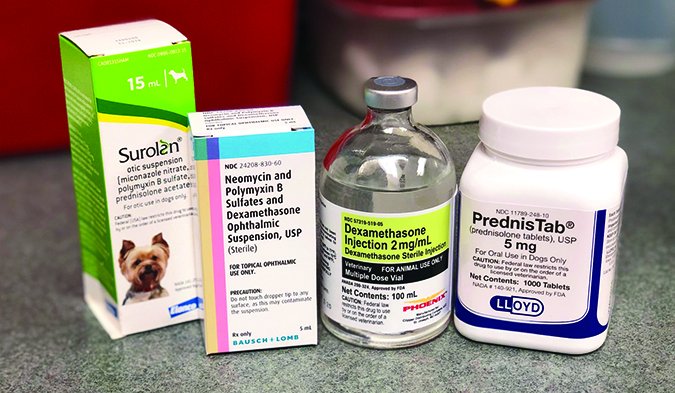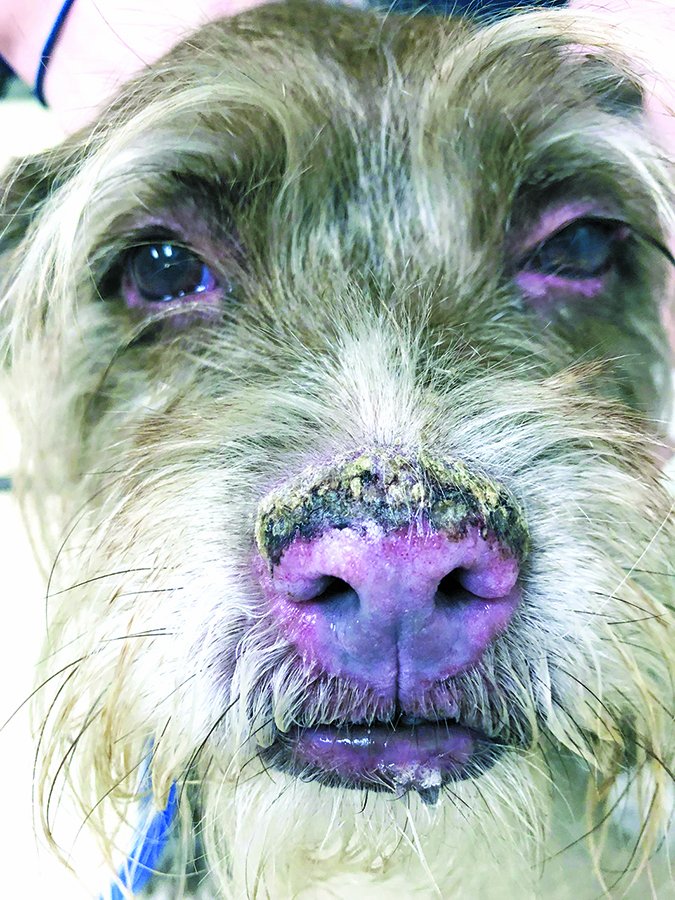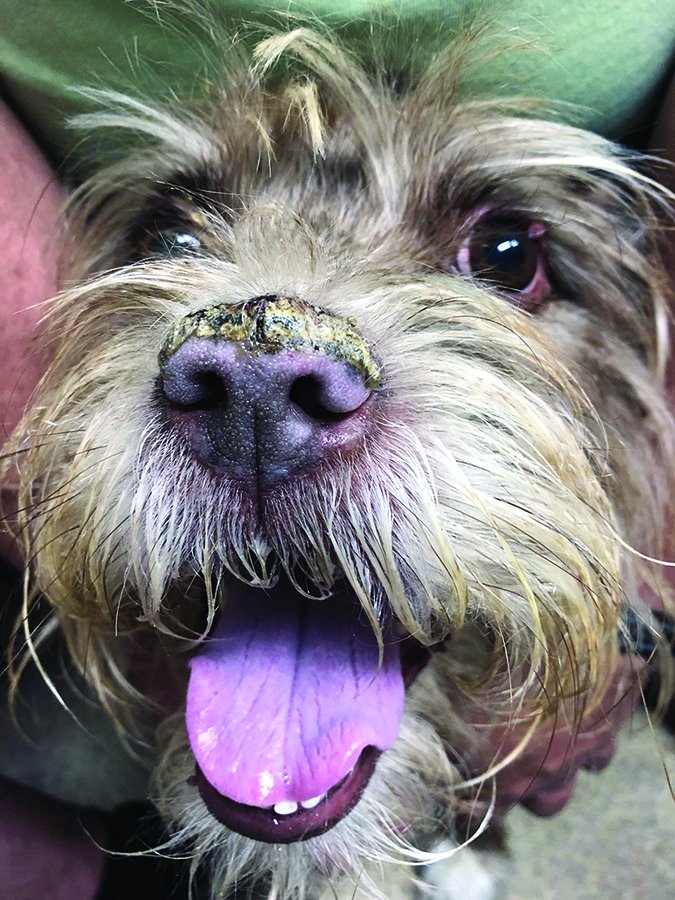Steroids are perhaps one of the most ubiquitous medications in the veterinary world. They can be used for a host of problems ranging from inflammation and allergies to autoimmune disease. While they are incredibly useful and diverse medications, steroids are not without significant side effects. It is important to know why they and how they can best be used. It is also critical to realize the possible negative effects and interactions that can occur. Steroids are not benign.
Corticosteroids, as they are more correctly called, include a varied group of medications. Some of the most commonly used in veterinary medicine are:
- Prednisone
- Temaril-P
- Neopredef (topical)
- Dexamethasone
- Dexamethasone sodium phosphate (“Dex-SP”)
- Methylprednisolone (Depo Medrol)
- Triamcinolone (Vetalog)
They come in many preparations including:
- Oral
- Injectable
- Ophthalmic (for use in the eye)
- Otic (ear)
- Topical sprays and powders
Steroids exert their activity in the body in many different ways. They affect every system, which is why it is important to make sure your veterinarian is aware of any medications that you give your dog, including over-the-counter supplements or pain relievers.
Steroids are very useful and important medications. But, as with any medication, using them correctly is critical to success. They have many side effects. Make sure to work closely with your veterinarian to ensure that steroids are the best option, as many medications are now available to take their place. If your veterinarian recommends or prescribes a corticosteroid, it is important to:
- Make sure you have informed your vet about every drug and supplement you give your dog, to ensure there are no adverse drug reactions caused by incompatible medications.
- Be sure you understand the dosing amounts and schedule, particularly when it comes to “weaning” your dog off of the medication.
- Don’t ask or allow your veterinarian to prescribe steroids for the long-term management of allergies; this use in particular can cause the development of other, even more serious health problems. Allergies are better addressed by applying oneself to discovering the offending allergen(s) and managing your dog’s exposure and using steroids only to control an acute flare-up of a “hot spot,” for example, and just on a short-term basis.
What Do Steroids do for Dogs?
Steroids for Itching Dogs
One of the most general uses of steroids is in fighting “the itch” (pruritus) caused by allergies. Allergies are common in dogs, especially breeds like Boxers, Labradors, Maltese, West Highland White Terriers, Bulldogs, and pit bulls. These allergies can be food- and flea-related, or caused by seasonal allergens – a condition called atopy.
The mechanism by which steroids control itching is complicated, but it includes decreasing the number of allergen-fighting cells (mast cells) in circulation and suppressing release of histamine. Histamine is one of the substances that leads to the formation of itchy hives and wheals.
For allergies, only short-term doses of steroids are recommended. Itching should be controlled while the inciting cause is identified and secondary infections treated, and then the steroids should be tapered off slowly. Newer drugs such as Apoquel (oral) and Cytopoint (injection) are slowly supplanting the regular use of steroids for itching.
The most commonly used oral steroids for allergies are prednisone and Temaril-P. Some veterinarians use longer-acting injections such as Vetalog, as well. Long-acting steroid injections can cause more pronounced side effects than their oral counterparts. Their use is becoming less common as other methods of itch control and more allergy management options become available. Topical steroids for both the skin and ears have extensive uses and may prove to be a better option than oral medications, as they cause fewer side effects. Topical use can decrease inflammation and itching. This is important within the ear canal, as less inflammation allows ear medications to penetrate deeper. It also damps down itching, so dogs are not continuously self-traumatizing.

Inflammatory Conditions
In conditions such as inflammatory bowel disease (IBD), steroid-responsive meningitis, and intervertebral disc disease, inflammatory cells dominate, causing redness, swelling, and pain. Steroids decrease inflammation by lowering white blood cell release from the bone marrow, among several other pathways.
This effect is helpful for addressing IBD and steroid-responsive meningitis. Doctors find steroids useful for treating intervertebral disc disease in humans and, anecdotally, some veterinarians report success with steroids for the same condition in their canine patients. However, the scientific literature isn’t really clear either way. The anti-inflammatory dose of steroids is generally fairly low, but side effects are still noted. Prednisone is used most often for this problem.
Canine Autoimmune Disease

Autoimmune (AI) disease, a general term describing a variety of ways that the body attacks itself, is common in dogs. The triggers for AI disease are poorly understood. Some antibiotics like cephalosporins have been implicated, as well as vaccines. Cancer also can induce autoimmune processes. In most cases, an underlying cause is never identified.
The list of autoimmune diseases are too numerous for this article, but they can affect all of the organ systems in the body, including the skin, brain, blood cells, joints, and other internal organs. Some of the more commonly seen disorders in veterinary medicine are immune-mediated hemolytic anemia (IMHA), immune-mediated thrombocytopenia (ITP), brain and spinal cord diseases such as meningitis, and skin diseases like pemphigus foliaceous and lupoid onychodystrophy.
ITP is an example of a well-known and frequently seen autoimmune disease, in which the body turns its defenses on its own platelets. Platelets are important in the first step of clotting. As the body attacks and destroys them, the platelet numbers drop rapidly. Bruises become visible on the skin and gums.

Steroids treat this and other immune diseases by suppressing the body’s immune system, its natural defense against infection and illness. In these cases, steroids are started at very high levels (as much as 2 to 4 mg/kg body per day). As the symptoms improve, the steroids are slowly tapered to the lowest dose possible. This is to keep the autoimmune disease in check while avoiding the worst side effects of steroids. Most dogs with an autoimmune disease will remain on steroids or other immunosuppressive medication for life.
Addison’s Disease
Another common condition in dogs is Addison’s disease. The body of a dog with Addison’s does not produce enough steroids and/or mineralocorticoids (responsible for water and electrolyte balance within the body). Cortisol and mineralocorticoids are essential for life, and when a dog’s body is not producing them, serious illness results.
The general symptoms of Addison’s are waxing and waning GI signs: weight loss, vomiting, diarrhea, and picky appetite. Addison’s is often called the “great pretender” because it can look like many other diseases and can be difficult to diagnose. In these cases, steroids are indicated to replace those that the body is not making, as well as supplementation with a medication called Percorten or Florinef to replace the other corticoids.
A few rare dogs with Addison’s can be maintained on Percorten alone; however, in times of stress or illness, they would require prednisone as well. Some dogs are affected by atypical Addison’s disease, in which only the cortisol levels are low. These patients can be even more difficult to diagnose, as the characteristic electrolyte changes on bloodwork are absent. Once diagnosed, these dogs must remain on a steroid for the rest of their lives. In this case, the steroids are usually administered on a twice daily to daily basis. The most commonly used steroid for this is prednisone, an inexpensive tablet.
Steroids for Dogs with Lymphoma and Other Cancers
Several cancers respond to steroids by shrinking. Lymphoma is a frequent cancer of dogs. The earliest symptoms are usually general malaise and enlarged peripheral lymph nodes (found underneath the jaw, in front of the shoulder blade, in the groin area, and behind the knee). Lymphoma is highly sensitive to chemotherapy and carries a good prognosis if treated aggressively.
Many owners opt for palliative care however, for a variety of reasons, including cost and concern for quality of life. Prednisone is an excellent palliative agent for lymphoma and can often keep it in remission for weeks to months. However, it is important to know that prednisone will interfere with chemotherapy. If your dog has been diagnosed with lymphoma, and you are considering chemotherapy, prednisone should not be started until speaking with an oncologist.
Many other cancers are often treated with oral steroids, as well. These are usually used adjunct to chemotherapy and/or radiation. Doses are higher than with anti-inflammation and anti-pruritus, usually in the range of 2 mg/kg of body weight per day or higher.
When Should Steroids Not Be Used on Dogs?
There are many cases where steroids are not an appropriate treatment. For some of the following examples, steroids remain controversial. Some veterinarians continue to use them based on years of experience (anecdotal), while others have discontinued use based on the same reasoning. Scientific data is somewhat conflicting and lacking on the subject, but these are the most current thoughts on steroid in certain situations:
Treatment for Shock
Steroids were once a common and well-accepted treatment in cases of shock. For example, if a dog was hit by a car, one of the first ministrations would be a large dose of steroids given by injection.
Over the years, it has become apparent in human medicine that steroids during shock are not helpful and are likely detrimental. They can downregulate important enzymes throughout the body, leading to worsening of low oxygen conditions (hypoxia, present during shock). This can lead to kidney and gastrointestinal damage as evidenced by bloody diarrhea and vomiting.
Steroids should no longer be used to treat shock. Instead, treatment should focus on oxygen therapy, pain relief, control of hemorrhage, and intravenous (IV) fluids.In Combination with NSAIDs
In Combination with NSAIDs
Non-steroidal anti-inflammatory drugs are very common in veterinary medicine and have a similar action in certain parts of the body. NSAIDs include meloxicam, carprofen, deracoxib, firocoxib, and several others. Using them with steroids can compound negative side effects and lead to gastrointestinal ulcers, hemorrhage, kidney damage, and in extreme cases, death. They should almost never be administered in tandem. The one exception is in the case of immune-mediated hemolytic anemia (IMHA). Patients with IMHA are prone to blood clot formation, so while steroids are used for immuno-suppression, very low dose aspirin also may be used to prevent clot formation. If a switch is required between these drugs, a wash-out period of at least two to three days is recommended to avoid these interactions. It is also critical to tell your veterinarian if you are administering any medications to your dog, especially over-the-counter pain relievers like canine aspirin (or human aspirin).
Snakebites
Even today, steroids are still used to treat snakebite victims. It has become apparent through research that steroids do not provide much (if any) benefit for these patients. The cases in which they might be useful are upper airway swelling as occurs with a bite to the mouth or neck or during an allergic reaction to antivenin. Otherwise, steroids are not indicated.
Side Effects of Steroids on Dogs
There are many well-known side effects of steroids. In the short term, dogs will drink and urinate excessively. A previously house-trained dog may start having accidents in the house. Dogs also will eat more. Often, heavy panting occurs. Restlessness and pacing are also side effects. Occasionally, dogs will behave in an agitated or aggressive way (the well-known “‘roid rage” syndrome noted in humans). If steroids are used long term, symptoms become more pronounced, and your dog may develop iatrogenic (caused by medication) Cushing’s disease.

Cushing’s disease occurs naturally when the adrenal glands overproduce cortisol (it is the opposite of Addison’s disease), the body’s natural steroid. This can occur due to either a brain tumor called a pituitary adenoma or an adrenal tumor. The symptoms of Cushing’s are weight gain, hair loss, panting, restlessness, frequent skin and urinary tract infections, and dramatic increases in urination and drinking. If oral or injectable steroids are administered frequently over extended periods of time, this syndrome can occur. Discontinuation of the steroids will reverse this.
Steroids should never be stopped abruptly. When steroids are taken orally or by injection, the body’s natural steroid levels drop. If the exogenous (originating from outside the body) source is stopped, the body needs time to recover and resume making its own (endogenous) cortisol. In this gap, patients can develop a steroid insufficiency and exhibit signs of Addison’s disease: vomiting, diarrhea, weight loss, and anorexia. Because of this, steroids should always be tapered slowly. Most courses will go from twice a day, to once a day, to every other day.
Steroids are very useful and important medications. But, as with any medication, using them correctly is critical to success. They have many side effects. Make sure to work closely with your veterinarian to ensure that steroids are the best option, as many medications are now available to take their place.







My dog, who is a service dog in training, had to get a steroid shot yesterday, she developed Hives the previous night and they just kept spreading and worsening, they were painful and itchy by the morning due to the amount of hives she had. They gave her the injection around 11 AM, the hives were gone by 2 PM, then around 3 PM she presented odd behaviors, She is typically very lovey towards everyone, has to be cuddling at all times but she was indifferent. It was kind of like the zombie of my dog walking around my house, it was her, but her mind wasn’t in there. Later that day we had a friend over who has a young toddler and a new born baby, my dog has never once been aggressive in any way shape or form, she kept running from the toddler which was unusual for her, she loves tiny humans, she went and layed in her kennel and I let her, later that day the child was dancing on his own, ignoring both dogs, when my dog started sniffing and getting closer, I was right there with her since I knew she was a little off, then she curled her lip and growled. I grabbed her collar but she slipped and tried to go for his face. I was not told of this behavior change, so I thought what is wrong with her? She is never aggressive, she always loves the tiny humans? Why would she do that? Called her vet and they said “oh yeah she may be irritable or aggressive, it’ll wear off” so yeah if your dog needs a steroid injection, it’s best to just keep them away from others as much as possible for 48 hours.
Thx for sharing.
My dog poppy is 10 1/2 she has COPD she is on 2 x 2mg of oral tablet steroids and been on them for about 4 mths , she is a lot better . Vet has said to lower them down to 1 tablet a day to see if she copes with her breathing . Shes gone wobbly on her legs does wee a lot and has started having accidents .she started swelling around her stomach so she is on frusimide 3 x daily aswell also on a 10 day course of 10mg gabepentin 2 x daily as she is having problems with her hind left leg . She is my baby I’ve had her 5 yrs she is a retired breeding dog and I just want what’s best for her .🐶🐾💗
Steroids are very dangerous in many cases.
My.yorkie with kidney disease.which was managed very well was prescribed steroids for bowel syndrom.disease because she wasn’t eating well.
Biggggg mistake we did ..it worsened her kidney failure to almost death!!!
She is now on IV fluids to save her life!!!
Please be aware ! There are holistic.ttratments not just powerful steroids!
Max the Weimaraner is 13 yr 3 months and has chronic bronchitis and a mass growing near is airway. He is on prednisone to keep the coughing down. The drug is working very well for him. He is on 10Mg daily, a minimum to keep the cough to a manageable level where it is not intense. He has increased thirst, and obviously more urination. He has a dog door that enables him to come and go as necessary. He had gained winter weight prior to starting the drug but with careful measurements of food, he has dropped 5 lbs. I am trying for a couple more to decrease the weight on his hips. He also has many lipomas. Which I hope the drug keeps them in check as well. He gets daily walks and is quite energetic while doing this, otherwise he is lounging around.
My staffy is 13 hrs on steroids for his back he’s started to be sick brown not all the time but now he’s gone very quiet again after being alother better anyone know what’s wrong
My dog Daisy is on prednisone to reduce inflammation as she has pancreatitis, as well as chronic kidney disease. The prednisone makes her pace or turn in circles. It also gave her a voricious appetite and she needs food every hour. If she doesn’t get it she’ll bark. This has been keeping us awake every night now for weeks.
I.hope your dog.made it.
Steroids make dogs very sick!
Not always good
Our dog Daisy has s tumor on her trachea. Our vet has prescribed her 20mg of prednisone twice a day. It has helped very much with inflammation and her chronic coughing. Although it has not helped her activity or her drinking water and eating. At this point our 12 year old Lab mix Daisy is on her last leg. Any thoughts to how we can help her eat and drink?
I would definitely try fenbendazole for a tumor or COPD. With nothing to lose and having not regularly dewormed any of our animals, i see a difference in my 10 year old dog’s tumor 3 days in. Not completely decided but going for 9 days treatment and repeating in 2 weeks.
I knew a man with small cell lung cancer who went home on hospice over a year ago. He’s still alive and the only thing he has done is start taking fenbendazole!!!
Ask your vet about Mirtazapine. It is an appetite enhancer.
Our dog Grace, a 3 year old Golden Retriever, had a grass seed deep in her ear close to her eardrum. The vet gave her a sedation to remove it and prescribed a 7 day course of 25mg Prednidale to combat the ear canal inflammation. The 7 day course was succeeded by a 15 day weening off period with reduced doses every 5 days. Grace has been hyper thirsty, more frequently urinating and extremely lethargic and totally not herself throughout the treatment so far. The ear inflammation actually disappeared after day 2 of the treatment. We still have 10 days of weening to go. I wish I had been given more information pre-treatment, I’m sure this course of treatment was excessive and the side effects quite alarming. I suppose the lesson here is; Make sure your vet gives you all the information before you agree to steroid treatment!
You are n so.right!!
Steroids are very dangerous!
Almost killed.my dog with manageable kidney disease.
She is.in Hospital for many days.on IV to save her.life!!
Hi everyone. My Cookie is mix of shitzu and puddle and is 8 years old. He suddenly started itching to the point where he bleeds. I took him to the vet and he diagnosed him with allergies. He said probably pollen or grass. He started him on prednisone, but after two doses my dog had x2 diarrheas today with frank blood. Otherwise he’s doing ok. Eating and drinking. What do you think?
Try changing diet no processed food no grains or wheat or a grain free dog food for sensitive tummies or just meat fish rice and we give our GSD an anti histamine a day she is 50kilos big dog so has one tablet a day as do we stops her itching and runny nose
Also regular brushing and baths to remove fur shedding and skin cells building up under coat 😁
My dog, 2 yrs old got a Boil like growth above his eye. It broke open and I rushed him to the vet. He had a foxtail in his eye that was going in his brain. Then a couple days after that treatment he got another boil like growth again on the other side that also broke open. He cry’s out. Went to vet again and they found Another foxtail. More pain meds. Now I have said he must have a foxtail inside his mouth because he hasn’t been able to open his mouth. I took his large marrowbone treat and his sisters small marrowbone and placed them side by side and explained he can no longer eat his daily treat and can only get the smaller one barely in his mouth. He walks around looking like he has a small cigar sticking out of his mouth. They sedated him and did some procedure and told me he had masticatory muscle myositis aka MMM. It’s an inflammation of the chewing muscle. They put him on Prednisone 20 mg. One half in am and half in pm. Within a couple days he was almost his old self. He ate his dry food rather than wet food I had been giving him. He ate his own larger treat, played with his toys, and slept in the bed with me. I thought this Prednisone must be a miracle drug. After a few days of that he lost all he had gained. Whenever I needed to walk past him he got up and went away from me like he was afraid of me. He now sleeps under my bed instead of in my bed. He is lethargic. Walks around like a zombie. Stands in one place with a stare like he’s trying to remember what he wanted to do. He’s crying out again. Today I noticed he’d evidently had one of those boil like growths on the side of his face that I’d missed and it had broken open just like the two other ones. He goes back to vet for follow up next week. I’m thinking maybe I should stop the Prednisone as he’s only been on it a little over a week. Im at a loss here. Can’t stand to see him in pain.
You cannot just stop prednisone. You must do a protracted weaning off of the medication. This is very important!
My guy passed away.
i’m sorry, judy. i wish i could hold your hand. i hope you are well today.
vet gave sophia a single shot of dexamethasone, which from what i understand is similar to prednisone 10am yesterday, for the swelling in her eyes and nose possibly caused by a food allergy or insect bite. 6.2kg liver shih tzu/lhasa apso, playful and a picky eater on most days but since the steroid shot, until 3am now she is eating so much, drinking so much and panting and pacing and trying to playing fetch bringing me everything, also she is too alert and overly clingy, i am worried for her heart beating so fast. i hope she returns to normal behavior soon, because her facial swelling has gone.
My yorkie is doing the same thing, when did it stop?
I would have asked for prednisone tablets rather than a shot….dexamethasone is far more potent steroid than prednisone and given by injection is harsh… for my dog a Westie with yearlong allergies causing distress of serious foot chewing and ear inflammation and occasional congestion, one 5 mg prednisone tab brings SERIOUS relief. and I give the pill only as needed, not daily. along with frequent baths with anti fungal shampoo.
I’m so sorry Judy
Thank you Valerie.
I went to Vet with a little alergie for my dog, pomeranian breed, vet priscribed 2 tablets in one go for 5 days and the 10 days with one tablet. After admitting fist 2 tablets my dog start vomiting after two hours and then all night diarrhoea and vomiting. So i stopped and next day didn’t gave her medication. Dog was drowsy all day, next morning which was today we found all downstairs full of her stool full with blood. Called vets informed about the situation but no advise given how now to treat my dog of pooing with lots of blood. This evening it was a bit less but it makes me worry so much and don’t know what to do now, went to vets to get treatment for allergie but got my dog horrible diarrhoea, vomiting and stool with blood. Is there any chance anyone can advise 🙏🙏🙏
How long did the bloody stool last?
My Great Dane was put on a steroid twice a day for the irritation from ear mites. She has started having accidents in the house and is so restless. I have stopped them after 4 days.
Thornit powder is a wonderful product for ear mites and itching in the ear canal. I have been using it for 50 years. Not expensive would never be without it 😘🇬🇧
Inga-I think you need a new vet! Maybe try to find one who practices holistic medicine as well as regular medicine…or just holistic.
Hi guys,I am writting from Poland, and English is not my strongest side, sorry for that, but I’d like to share my story. My dog Amelia is going to reach her 20th birthday this year. One year ago she started coughing, it was horrible for her and for us. We tried different therapies but nothing helped. Finally she was diagnosed with chronic bronchit and administrated cortizol. It really helps, at the moment she is on the lowest dose which is 2,5 mg a day (quite a small dog). She was always in good health state, after about 7 months therapy I’ve noticed that she is more hungry but doesn’t gain weight, the only problem is urinating at home. I do consider side effects but bearing in mind her age, the overall quality of the rest of her life is the most important thing. All the best for you and your dogs.
My 6yr old staffy had developed an uncontrollable itch causing her to chew her feet bloody if left unsupervised for more than 5 minutes, day and night.
Vet prescribed prednisolone. Although it stopped the itch and given her energy it has caused her to be clingy, restless, panting, thirsty but most of all it had a huge effect on my dog’s seizure frequency (epilepsy) which has been treated with pehonarbitone.
Usually she has 1 or 2 nights of seizures (2 or 3 spread over an hour) per month. After 1 day of being on prednisolone she has had 2 continuous nights of the worst seizures she has ever had. Last night she had 4 massive seizures within 10 minutes.
Cytopoint didn’t have any side-effects last time my dog had this issue.
If it happens for the 3rd night running i’m going to stop the medication because I’m afraid the change is going to kill her.
Hi Joe, my dog got Diabetes from being on cortico steroids and many other complications that are looking very dire for her. (Kidney failure, gall bladder inflammation and pancreatitis to name a few). She was only on them for one month, and I have had to really watch her because the high blood sugar and low blood sugar can cause seizures. If your dog is weeing and drinking excessively try testing her urine at the vet for glucose levels!!
What You Should Know About Prednisone for Dogs?
My little dog Buttons went to the vets because she was licking her knees and making the hair fall out. The vet said she had an allergy and they gave her a shot of Cytopoint and two days later she had a stroke. To make along story short, Buttons also had a seizure, and is now paralyzed. After 4 diagnosis and 5 emergency trips to the hospital (different vet of course) I am now being told she has a brain disease. $6,000 to know for sure with an MRI. (Which of course I did not have the money to do, and even though I have Trupanion Insurance, I would have to come up with the money first. Does that make any sense? Why have insurance?
How can a perfectly healthy 6 year old go through all this?
Cytopoint is causing strokes, seizures, paralysis and even death in many dogs.
PUP PARENTS BE AWARE.
Now the vet wants to give her prednisone and I just want to run to the hills and SCREAM NO WAY.
My Buttons has gone from 10 lbs to 4, and is still so full of life. She is alert and is eating on her own, going to the bathroom, licks me and her tail wags with gusto and she is so full of Love and Hope. That is why I have not put her to sleep like many people ask. Open for any advice, prayers, and encouragement. Lynn Murphy / Santa Clara, CA
Oh my goodness! an amazing article dude. Thank you However I am experiencing problem with ur rss . Don’t know why Unable to subscribe to it. Is there anybody getting an identical rss problem? Anybody who is aware of kindly respond. Thnkx
you’ve an ideal weblog right here! would you like to make some invite posts on my blog?
I’m going crazy and broke so broke I’m living on ice cream my dog’s vets are billionaires and I’m starving to death ive given him apapquil cyterpiont and now macroione tablet’s he’s been bleeding from the bowels heaps of times until I started the macroione but now he’s peeing a hundred times a day constantly thirsty and hungry becoming angry and very disobedience he’s never been disobedience never he’s restless all night and never sleeping anymore GOD help us I’m sick with cancer and he’s also a mess on drug Valley I can’t cope with so many issues trying to help my romen nose bull terrier to survive without itching and skin blisters around his mouth without the drugs there’s got to be something that doesn’t kill him off slowly because if he dies I die that’s our motto we made together he also has gastrointestinal issues and his wet foods are 75 dollars per 12 cans and dry food 1.5kg 45 dollars 💸I need help or we both be dead soon I’ll definitely be first trying to survive on ice cream with cancer ♋️
You failed to mention steroids are used in the treatment of heartworm disease.
Very good article! I have a 5 year old female Great Dane that has been on a compounding steroid called Budesonide SR 5mg capsules. She has been on these for just over 2 years. Prior to taking this medication we almost lost her to IBD not knowing what was going on with her till we got her into a specialist that ran testing on her and labs. She has a been so much better and gained her weight back. Is eating and not vomiting. We do have to take her in every 6 months for blood test and a check up to make sure all is ok with her internal organs. The only thing so far that she is experiencing is wanting to eat more than usual. Her skin is turning dark and the hair looks like is falls out. I added a fish oil product to her food daily which helped a lot for the hair falling out. Her dark skin seems to be slowing down. Maybe it is my imagination I do not know? However She does look a lot better now. I am just happy I have her with me!
My dog was diagnosed with allergies and the first line of action for vets was longterm steroid use 😒. I spoke with them all multiple times about my concerns with steriod use. They brushed me off abd told me that steriods were the only solution. I had to go to three different vets over the course of two years before I found one that would help me find other solutions.